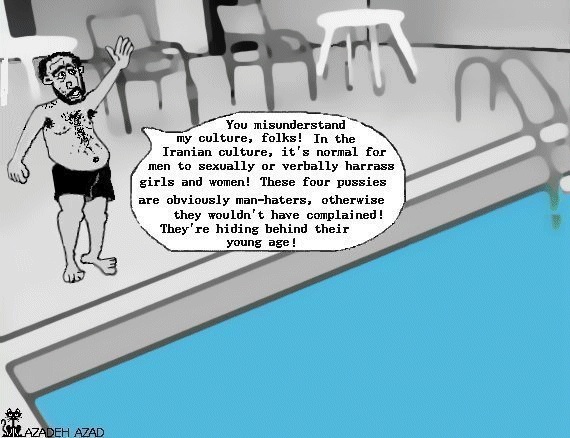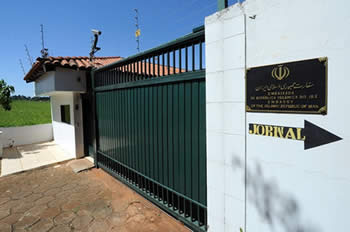![]()
Originally published by The Meir Amit Intelligence and Terrorism Information Center, Iran bulletin number 165.
The involvement of an Iranian diplomat in sexual abuse in Brazil has Iran’s media in a frenzy. Hekmatollah Ghorbani, 51, a diplomat stationed in the capital of Brazil, was questioned by police in Brasilia last weekend on charges of molesting two girls aged 9 and 14 at a local swimming pool. He was handed over to police following complaints from the girls’ parents, but was released under diplomatic immunity.
The Iranian embassy in Brazil denied the allegations against the diplomat, claiming it was a misunderstanding which resulted from “cultural differences” between the two countries. Foreign Ministry Spokesman Ramin Mehmanparast denied the allegations as well, saying that the media reports in Brazil are not indicative of reality and are not consistent with the diplomat’s past background (IRNA, April 19).
The incident and the Foreign Ministry’s reaction drew strong criticism from some media in Iran. The conservative daily Jomhuri-ye Eslami said that the reaction of the Foreign Ministry does not answer the question of whether the diplomat was actually present at a mixed-gender swimming pool. The newspaper demanded explanations from the Foreign Ministry about the issue, and wondered why it does not control the behavior of its employees (Jomhuri-ye Eslami, April 21).
The Tabnak website, too, expressed surprise over the reaction of the Foreign Ministry, saying that the reaction causes damage to Iran’s reputation. The website wondered what the diplomat had been doing in such an establishment, and whether Iranian diplomats do not abide by regulations that apply to those who represent the Islamic republic abroad. The question of whether the reports published about the incident are true or false is less important, according to Tabnak, than the reactions to the reports, which affect international public opinion.
The website compared the Foreign Ministry’s handling of the incident to President Obama’s strong reaction to his bodyguards’ involvement in an incident during his visit to Colombia several weeks ago. The American reaction to the incident was severe, and the bodyguards, who were involved in a prostitute scandal at a nightclub, were sent back to the United States even before the president’s visit was over (Tabnak, April 21).
Mehr News Agency also harshly criticized the Foreign Ministry for its reaction to the incident, saying that it reflects the problematic and inappropriate conduct of the Foreign Ministry and Iranian diplomats stationed abroad.

Intuition Press Agency, April 24, 2012 - A Brazilian investigator revealed to the International press that Hekmatollah Ghorbani, the Iranian diplomat who was accused of molesting underage girls at a swimming pool in Brasilia, had made a speech, from across the pool, to the angry parents, explaining the nature of a “cultural misunderstanding” that had led to the parents’ over-reaction, a few minutes before his arrest by the police. (by Azadeh Azad / iranian.com)
A commentary article published by the news agency cited several examples of past incidents as evidence that the Foreign Ministry allegedly does not exercise sufficient control over the appointment and conduct of diplomats in other countries. The problematic conduct of Iranian diplomats can be seen, for instance, in the defection of Mohammad Reza Heydari, the Iranian consul in Norway, and Hossein Alizadeh, chargé d’affaires at the Iranian embassy in Finland, after the riots that broke out following the 2009 presidential elections. Another instance of inappropriate conduct by Iranian diplomats was in 1989, when Iran’s ambassador to Romania was involved in arranging a visit in Tehran for Romanian dictator Nicolae Ceausescu shortly before he was apprehended and executed. As a result of criticism from the Majles about the Foreign Ministry’s handling of the affair, the then foreign minister Ali Akbar Velayati impeached Jamshid Gohari, the ambassador in Bucharest, claiming he had not provided Tehran with any information on the unstable internal situation in Romania on the eve of Ceausescu’s visit.
A similar incident took place during last year’s riots in Libya, when Iran’s ambassador to that country, Ali-Asghar Naseri, was on vacation during the anti-Gaddafi uprising. At the time, a spokesman for the Foreign Ministry denied media reports about the issue; however, shortly afterwards, an Iran Broadcasting correspondent sent to Libya reported on his Facebook page that the staff of the Iranian embassy in Tripoli had been on vacation for six months. Following the report, Foreign Minister Ali Akbar Salehi went to Libya and removed Naseri from his position.
The conduct of Hamid Baqa’i, President Ahmadinejad’s emissary for Asian affairs, sparked a controversy when, during a conference held in Tehran in August 2010, he discussed the massacre committed by the Ottoman Empire against the Armenians during World War I, which instigated a serious diplomatic incident between Iran and Turkey.
According to Mehr, the most prominent example of the problematic conduct of Iranian diplomacy could be seen in former foreign minister Manouchehr Mottaki’s dismissal by President Ahmadinejad during the former’s visit to Senegal in December 2010 (Mehr, April 22).



 RSS
RSS











Latest Comments
Hello Mike, Thank you for your positive feedback to the article. I felt there wasn’t too much critical analysis of ...
Thanks for this considered and well constructed article. A follow up article on the manner in which the editorial contro...
THE CLUELESSNESS OF CLAIMING THAT OBAMA'S MIDDLE EAST POLICIES WERE A FAILURE CANNOT BE FURTHER FROM THE TRUTH, WHAT THE...
As long as Obama is the president of the usa do not trust the us government......
Thank you for an good read....